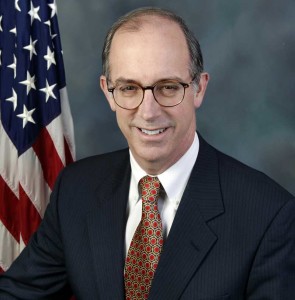Chester County Republican is lead sponsor on bill that proposes major changes for new state employees, teachers
By Mike McGann, Editor, The Times
Pension reform took front and center in a press conference featuring local State Representative Chris Ross (R-158) and Gov. Tom Corbett in Harrisburg, Tuesday.
Ross, the Chester County Republican, is leading the fight in the state House of Representatives for Corbett’s pension reform plan, and serves as the bill’s house sponsor.
As presented the bill would swap new public employees (those hired after either January — for state workers — or July — for public school employees — or 2015) from a traditional pension into a system more akin to a 401K plan, while reducing future accumulation of benefits for current employees. No current benefits would be changed by the plan, nor would current retirees see any changes. In the near term, school districts, the state and other public bodies would see a slowdown in the rate of increase in pension contributions for the next three years.

“Pennsylvania’s pension funding situation is quickly reaching a crisis,” Ross said. “Something must be done soon to bring these costs into line. Failure to do so would not only be irresponsible, but would threaten our schools and the state’s ability to meet its obligations.”
He acknowledged that making these changes was not universally popular — that hundreds of state employees and local teachers have contacted him to express either concern or opposition to the governor’s plan — and he admitted that changes might be “painful” for some.
“It’s going to be a little unpopular,” he allowed.
The governor, in thanking Ross for spearheading the effort in the house, said action needed to be taken immediately. Corbett said that his administration had little option but attempting to address the issue immediately.
“This is an issue we didn’t go looking for,” Corbett said of the pension issue. “But it is staring us in the face.”
He said that the reductions in pension rates would save school districts some $138 million in the near term, and slow both the increase of tax hikes or cuts to staff and program in schools.
“New calculations show that our unfunded liability has risen to a staggering $47 billion,” Corbett said. “We can no longer ignore our debt to Pennsylvania. We must take action now.”
Even if passed by the legislature, the proposed changes would still face likely court review — the state Constitution prevents reduction of pension benefits. Corbett is arguing that refers to already accrued benefits, as opposed to changing future earnings and benefits.
And he admits none of the public unions support the effort.
Tuesday, Pennsylvania State Education Association President Mike Crossey said in a statement that the plan could expose the state, school districts and ultimately, taxpayers to more, not less, liability.
“The only news to report on the governor’s plan is that it is as bad today as it was when he first announced it in February,” Crossey said. “It’s a ‘lose-lose’ proposition based on unattainable assumptions that will cost taxpayers more in the long run.”
Crossey also questioned whether switching new hires to a 401-style defined contribution plan would actually create a bigger problem for the existing pension plan fund, cutting it off from pension funds from younger workers.
“The governor wants to run two pension systems for the price of one, but it can’t be done,” Crossey said. “This will cost taxpayers more and won’t do anything to clear the pension debt. Plans like this are what caused the problem in the first place.”
The changes would build on Act 120 of 2010 and extend to existing employees some of the changes and limits placed on new hires at that time: specifically reducing the multiplier to 2.0 from 2.5, basing final pension numbers on a larger number of years and capping the pension amount to a fixed percentage — 110% — of their salaries during their final four years of employment. Employees would be allowed to “buy up” the multiplier back to 2.5 through additional payments into the pension fund.
New hires would see the biggest changes, moving from a definted benefit plan to a defined contribution plan — a 401A retirement plan. Consistent with the defined benefit plans currently in use, state employees would be required to contribute 6.25 percent of their salary to the plan, while public school employees would be expected contribute at least 7.5 percent.
Ross expressed confidence that the house would be able to take up this bill, as well as those concerning liquor privatization, Corbett’s transportation bill as well as the new state budget before the legislature adjourns for the summer on June 30.





